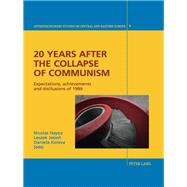
| Introduction: Paths of Ambiguous Transformation after 20 Years | p. 9 |
| Ambiguities of Unfinished Transformations | |
| A Sketch on Europeanization with the EU in Focus: Poland 1989û2004û2009 | p. 27 |
| The Influence of EU Conditionality and Europeanization on the Consolidation of Macedonia | p. 49 |
| From Big Political Change to Permanent Change of Governments. The Logic of 20 Years of Political Party Competition in Central and Eastern Europe | p. 85 |
| Beyond Democracy: The Relevance of Informal Power in Eastern Europe | p. 119 |
| Trust, Path Dependence and Historical Legacy: The Second Decade after Transition | p. 143 |
| The Missing æFunctional EliteÆ and the Challenge of Democratization | p. 167 |
| The Promise of 1989 û KosovoÆs Lost Treasure | p. 177 |
| Nationalism, Democracy and Independence Revisited: The Cases of Kosovo and Abkhazia | p. 203 |
| External (F)actors in Democratization: Lessons From the Georgian Experience | p. 229 |
| Societal Values in Georgia: Twenty Years Later | p. 253 |
| Mythologies of Postsocialism: The Legends of Revolution and Transition Twenty Years after the Fall of the Berlin Wall | p. 273 |
| Confronting the Past | |
| Baltic Lieux de mémoire of the 1990s to Early 2000s: Nostalgia, Trauma, Change | p. 295 |
| Different Meanings of May 9th, Victory Day over Nazi Germany for Russia and the Baltic States | p. 319 |
| (Re)writing History in the 1990s: Croatia and World War II Politics of Remembrance in Croatia û from the 1990s to the Present Day | p. 337 |
| Post-Soviet Ukraine and Belarus Dealing with ôThe Great Patriotic Warö | p. 369 |
| ôCossacks into State-Buildersö û Constructing Historical ôCossack-Statehoodö in Ukraine: A Case Study | p. 383 |
| The Forgotten Legacy of Solidarno?? and Lost Opportunities to Build a Democratic Capitalist System Following the Fall of Communism in Poland | p. 395 |
| Hope for the Past? Postsocialist Nostalgia 20 Years Later | p. 417 |
| Traces of Yugoslavia: Yuniverse Beyond Nostalgia | p. 435 |
| Current Czech Opinion of the pre-1989 and post-1989 Regimes: Disillusionment with Politics, Regardless of Party Political Allegiances | p. 461 |
| Recasting Transitions after The Fall: global Governance of Trauma and the Politics of Life in Bosnia and Herzegovina | p. 495 |
| Texts in Changing Contexts: Values and Meanings | |
| High Heels and Blue Jeans. What Are the Visible Signs of Democracy? | p. 521 |
| Nation, Border and Territory û Reflecting on Croatian Experiences | p. 537 |
| From Controlled Liberalism to Real Pluralism The Development of Philosophy in Poland at the End of the Communist Era | p. 559 |
| Between a Valley of Joy and a Valley of Nothingness The Year 1989 and Polish Literature | p. 573 |
| How to Tell the Truth with Words: Romanian Post-Communist Literature | p. 589 |
| Essay and Travelogue. Two Literary Genres that Have Been Rediscovered during the Debate on the Yugoslavian Collapse | p. 609 |
| Blaming versus Healing: Facing Communist Informers of the Past, and a Literary Example in Péter EsterházyÆs Revised Edition | p. 629 |
| Crimes Against Everyday Life, or On the Patho-Anthropology of Socialism | p. 647 |
| The Authors | p. 669 |
| Table of Contents provided by Publisher. All Rights Reserved. |
The New copy of this book will include any supplemental materials advertised. Please check the title of the book to determine if it should include any access cards, study guides, lab manuals, CDs, etc.
The Used, Rental and eBook copies of this book are not guaranteed to include any supplemental materials. Typically, only the book itself is included. This is true even if the title states it includes any access cards, study guides, lab manuals, CDs, etc.